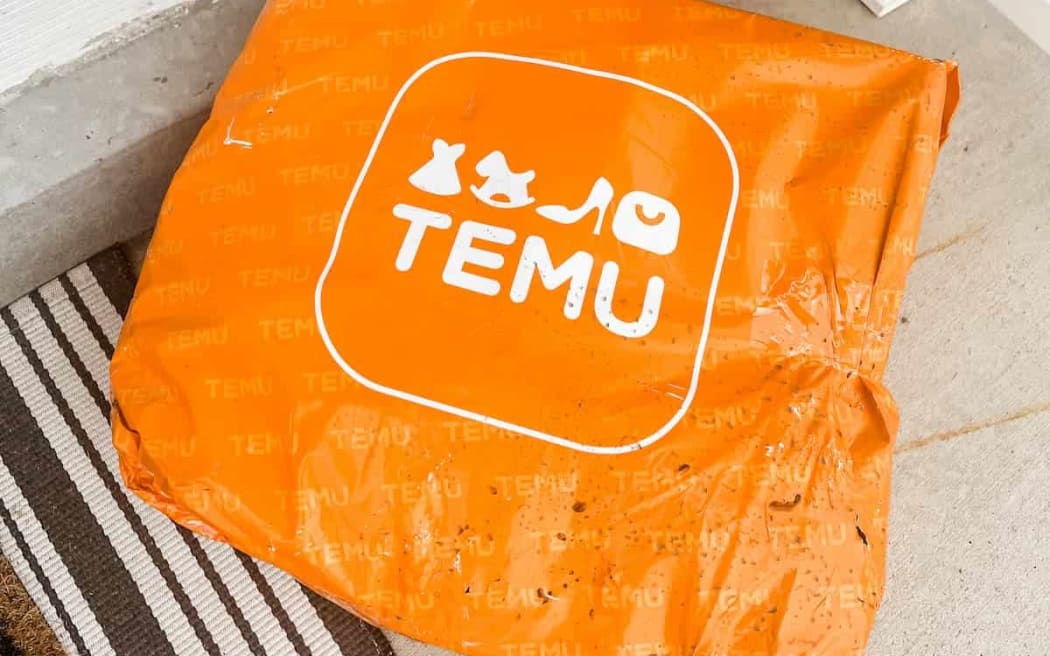Criticism of Temu ranges from data mining to rampant waste production to potentially forced labour use, but that hasn't stopped it becoming the world's fastest growing online retailer in just 18 months.

Photo: Nicole Serrano
This story has been updated to reflect a reply we have received from Temu.
It has been accused of using slave labour, selling customers' personal details and feeding people's thirst for instant cheap goods at a fraction of the price of other retailers.
But despite the allegations and investigations by the likes of the US government, the e-commerce giant Temu keeps on growing.
"It's like AliExpress on steroids. It's hardcore," says BusinessDesk investigations editor Victoria Young - who's also a Temu user.
The Chinese-owned company has taken online retail to a new level and turned shopping into a game, she says, with a pyramid-style formula that uses influencers and the slogan "Shop Like a Billionaire".
Unlike its online rival Shein which sells fast fashion, Temu sells a vast array of products from clothing to wireless doorbell cameras to leather bags at rock bottom prices, and express ships them around the world.
It is less than 18 months old but is now the top app by downloads in the US, bigger than even Amazon. Its rapid growth has sparked investigations by US lawmakers into claims it uses forced labour and that it is importing products into the US duty-free.
The BBC reports UK anti-slavery charities have raised similar concerns, with suggestions that Temu sources its goods from areas where forced Uyghur slave labour is used.
Temu told the BBC that it strictly prohibits the use of forced, penal or child labour and that "anyone doing business with it must comply with all regulatory standards and compliance requirements".
Young explains Temu's background to The Detail and looks at the slave-labour and data mining allegations in the New Zealand context.
The company is owned by the Nasdaq-listed PDD Holdings, which was founded by billionaire Colin Huang. Formerly based in Shanghai, it has relocated to Dublin, likely for tax reasons.
Its products are dirt cheap because Temu cuts out the middle man, directly sourcing the products from the suppliers and selling on to the customers. Temu's aggressive, intense marketing model that relies on a form of pyramid selling, where customers refer it to their network of friends, sets it apart, says Young.
She describes how she was introduced to the online megastore by a friend.
"A girlfriend of mine posted in a group chat: 'Can you accept my invitation so I can get a free gift'."
Young clicked to accept the invitation and was immediately offered 10 free gifts herself, followed by promises of 10 percent discounts.
"And then the wheels start spinning and then you tap the wheel and it says, 'Hooray', you've won free shipping." The casino-style game continued until she was told if she wanted her 10 free gifts she needed to share it with friends. Just as aggressive are the follow-ups with three daily emails from Temu urging her to buy more.
Young says the pyramid technique combined with the company's huge marketing budget - reportedly more than $3 billion a year - its use Instagram influencers to show off their Temu "hauls" and advertising at big events such as the Super Bowl makes it a hard act to follow for local retailers.
The Detail also talks to local influencer Kate Hall, known to her 45,000 followers as Ethically Kate.
She admits she tries to ignore Temu as she takes her message of living sustainably to small groups around the country.
After studying business psychology she sees how the online giant is capturing customers by turning shopping into a game.
"I think we'll see more of those themes of that type of shopping which makes me sick to even think about."
But Hall says even so-called sustainable companies are sending daily emails to customers.
"When we think about sustainability we're not just talking about the environment, we're talking about your marketing tactics," she says. "When a company emails you every day with things, they're trying to play to your thirst for new stuff."
Four days after this episode aired, Temu's public relations firm contacted us.
It was requesting a right of reply on the gamification aspect of its operations, which you can read in an abridged version below. The full version of the statement didn't make sense to us, and referred to issues we had not looked at.
We asked the spokesperson if we could interview someone from the company but were told no one from Temu was available. The statement did not address issues of child labour, sustainability, spamming consumers with constant emails, or data mining.
"The interactive gamification features provide consumers with value-for-money deals. By unlocking discounts, users can access products at a lower cost than they would elsewhere. This can be especially beneficial for consumers looking to maximize the value they receive for their money.
"We have always strived to provide consumers with high-quality, affordable products while creating a safe and positive shopping experience. We want this experience to be enjoyable.
Many of the ideas for our apps actually come from our own offline shopping experiences. For example, we might often find entertainment performances, games, and activities like lucky draws and prize wheels in public areas of shopping malls. Currently, most of the activities in our app are inspired by these traditional offline entertainment. However, we hope that as we deepen our understanding of consumers and local contexts, we can develop more activities that align with regional characteristics. We would greatly appreciate any suggestions you might have.
"We have zero motivation or intention to skirt the edges of compliance just to increase so-called traffic to platform. Our core strength lies in our long-term supply chain advantages. At the same time, we want our app to stand out from other, more boring apps, to have some color, and to bring more joy. If there's a law or a general consensus (it doesn't even need to be a law) that something is not good for consumers, we are 100 percent in favor of changing it. Because in the long run, it's not beneficial for us. It would prevent us from thriving in the long term, and without that, everything else becomes meaningless."
Check out how to listen to and follow The Detail here.
You can also stay up-to-date by liking us on Facebook or following us on Twitter.

Photo: RNZ


